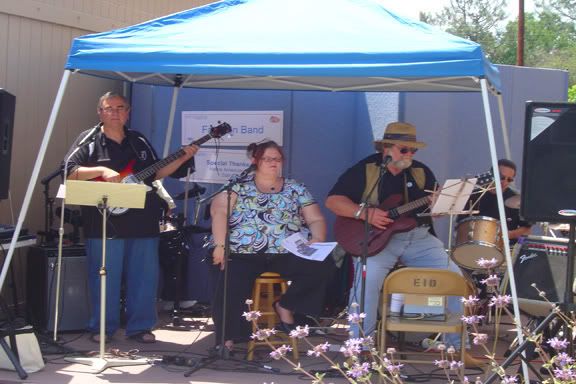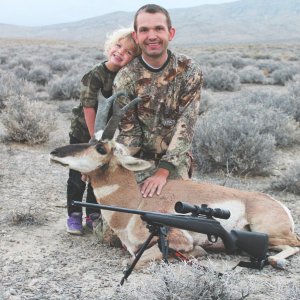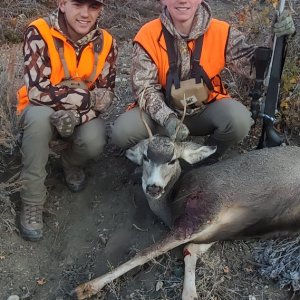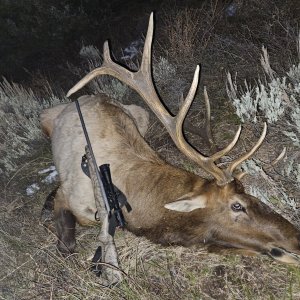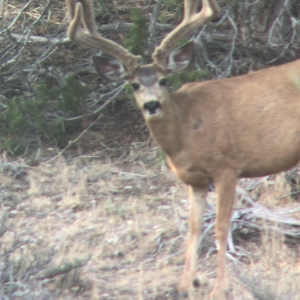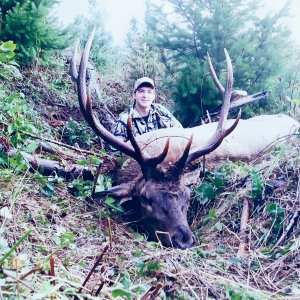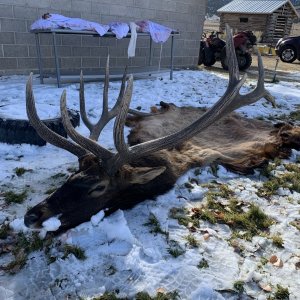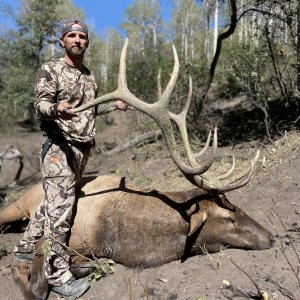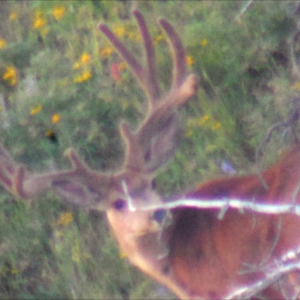>>
>>
I may just use this as
>>my signature
>>
>>
>>
>>
>>War and Peace (Russian: Война и
>>мир, Voyn? i mir), a
>>Russian novel by Leo Tolstoy,
>>is considered one of the
>>world's greatest works of fiction.[1]
>>It is regarded, along with
>>Anna Karenina (1873?1877), as his
>>finest literary achievement.
>>
>>Epic in scale, War and Peace
>>delineates in graphic detail events
>>leading up to Napoleon's invasion
>>of Russia, and the impact
>>of the Napoleonic era on
>>Tsarist society, as seen through
>>the eyes of five Russian
>>aristocratic families.
>>
>>Portions of an earlier version having
>>been serialized in the magazine
>>The Russian Messenger between 1865
>>and 1867, the novel was
>>first published in its entirety
>>in 1869.[2] Newsweek in 2009
>>ranked it top of its
>>list of Top 100 Books.[3]
>>
>>
>>Tolstoy himself, somewhat enigmatically, said of
>>War and Peace that it
>>was "not a novel, even
>>less is it a poem,
>>and still less an historical
>>chronicle."[4]
>>
>>Contents [hide]
>>1 Crafting the novel
>>1.1 Realism
>>2 Reception
>>3 Language
>>3.1 English translations
>>4 Background and historical context
>>5 Plot summary
>>5.1 Book/Volume One
>>5.2 Book/Volume Two
>>5.3 Book/Volume Three
>>5.4 Book/Volume Four
>>5.5 Epilogues
>>6 Principal characters in War and
>>Peace
>>7 Adaptations
>>7.1 Film
>>7.2 Opera
>>7.3 Music
>>7.4 Theatre
>>7.5 Radio and television
>>7.6 Full translations into English
>>8 See also
>>9 References
>>10 External links
>>
>>
>>[edit] Crafting the novel
>>
>>An undated photograph of Leo Tolstoy
>>dressed for the Russian weatherWar
>>and Peace is famously long
>>for a novel (though not
>>the longest by any means).
>>It is subdivided into four
>>books or volumes, each with
>>subparts containing many chapters.
>>
>>Tolstoy got the title, and some
>>of his themes, from an
>>1861 work of Proudhon: La
>>Guerre et la Paix. Tolstoy
>>had served in the Crimean
>>War and written a series
>>of short stories and novellas
>>featuring scenes of war. He
>>began writing War and Peace
>>in the year that he
>>finally married and settled down
>>at his country estate. During
>>the writing of the second
>>half of the book, after
>>the first half had already
>>been written under the name
>>"1805", he read widely, acknowledging
>>Schopenhauer as one of his
>>main inspirations, although he developed
>>his own views of history
>>and the role of the
>>individual within it.[5]
>>
>>The novel can be generally classified
>>as historical fiction. It contains
>>elements present in many types
>>of popular 18th and 19th
>>century literature, especially the romance
>>novel. War and Peace attains
>>its literary status by transcending
>>genres. Tolstoy was instrumental in
>>bringing a new kind of
>>consciousness to the novel. His
>>narrative structure is noted for
>>its "god-like" ability to hover
>>over and within events, but
>>also swiftly and seamlessly to
>>take a particular character's point
>>of view.[6] His use of
>>visual detail is often cinematic
>>in its scope, using the
>>literary equivalents of panning, wide
>>shots and close-ups, to give
>>dramatic interest to battles and
>>ballrooms alike. These devices, while
>>not exclusive to Tolstoy, are
>>part of the new novel
>>that is arising in the
>>mid-19th century and of which
>>Tolstoy proves himself a master.[7]
>>
>>
>>[edit] Realism
>>Tolstoy incorporated extensive historical research, and
>>he was influenced by many
>>other novels as well.[8] Himself
>>a veteran of the Crimean
>>War, Tolstoy was quite critical
>>of standard history, especially the
>>standards of military history, in
>>War and Peace. Tolstoy read
>>all the standard histories available
>>in Russian and French about
>>the Napoleonic Wars and combined
>>more traditional historical writing with
>>the novel form - he
>>explains at the start of
>>the novel's third volume his
>>views on how history ought
>>to be written. His aim
>>was to blur the line
>>between fiction and history, in
>>order to get closer to
>>the truth, as he states
>>in Volume II.
>>
>>The novel is set 60 years
>>earlier than the time at
>>which Tolstoy wrote it, "in
>>the days of our grandfathers",
>>as he puts it. He
>>had spoken with people who
>>had lived through the war
>>of 1812 (In Russia), so
>>the book is also, in
>>part, accurate ethnography fictionalized. He
>>read letters, journals, autobiographical and
>>biographical materials pertaining to Napoleon
>>and the dozens of other
>>historical characters in the novel.
>>There are approximately 160 real
>>persons named or referred to
>>in War and Peace.[9]
>>
>>[edit] Reception
>>The first draft of War and
>>Peace was completed in 1863.
>>In 1865, the periodical Russkiy
>>Vestnik published the first part
>>of this early version under
>>the title 1805 and the
>>following year published more of
>>the same early version. Tolstoy
>>was increasingly dissatisfied with this
>>version, although he allowed several
>>parts of it to be
>>published (with a different ending)
>>in 1867 still under the
>>title "1805" He heavily rewrote
>>the entire novel between 1866
>>and 1869.[10] Tolstoy's wife Sophia
>>Tolstoy handwrote as many as
>>8 or 9 separate complete
>>manuscripts before Tolstoy considered it
>>again ready for publication.[11] The
>>version that was published in
>>Russkiy Vestnik had a very
>>different ending than the version
>>eventually published under the title
>>War and Peace in 1869.
>>
>>
>>The completed novel was then called
>>Voyna i mir (new style
>>orthography; in English War and
>>Peace).
>>
>>Tolstoy did not destroy the 1805
>>manuscript (sometimes referred to as
>>"the original War and Peace"),
>>which was re-edited and annotated
>>in Russia in 1983 and
>>since has been translated separately
>>from the "known" version, to
>>English, German, French, Spanish, Dutch,
>>Swedish, Finnish and Korean. The
>>fact that so many extant
>>versions of War and Peace
>>survive make it one of
>>the best revelations into the
>>mental processes of a great
>>novelist.
>>
>>Russians who had read the serialized
>>version, were anxious to acquire
>>the complete first edition, which
>>included epilogues, and it sold
>>out almost immediately. The novel
>>was translated almost immediately after
>>publication into many other languages.
>>
>>
>>Isaac Babel said, after reading War
>>and Peace, "If the world
>>could write by itself, it
>>would write like Tolstoy."[12] Tolstoy
>>"gives us a unique combination
>>of the 'naive objectivity' of
>>the oral narrator with the
>>interest in detail characteristic of
>>realism. This is the reason
>>for our trust in his
>>presentation."[13]
>>
>>[edit] Language
>>Although Tolstoy wrote most of the
>>book, including all the narration,
>>in Russian, significant portions of
>>dialogue (including its opening paragraph)
>>are written in French and
>>characters often switch between the
>>languages. This reflected 19th century
>>reality since Russian aristocracy in
>>the early nineteenth century were
>>conversant in French, which was
>>often considered more refined than
>>Russian?many were much less competent
>>in Russian. An example in
>>the novel is Julie Karagina,
>>Princess Marya's friend, who has
>>to take Russian lessons in
>>order to master her native
>>language.
>>
>>It has been suggested[14] that it
>>is a deliberate strategy of
>>Tolstoy to use French to
>>portray artifice and insincerity, as
>>the language of the theater
>>and deceit while Russian emerges
>>as a language of sincerity,
>>honesty and seriousness. When Pierre
>>proposes to Helene he speaks
>>to her in French?Je vous
>>aime?and as the marriage emerges
>>as a sham he blames
>>those words.
>>
>>As the book progresses, and the
>>wars with the French intensify,
>>culminating in the capture and
>>eventual burning of Moscow, the
>>use of French diminishes. The
>>progressive elimination of French from
>>the text is a means
>>of demonstrating that Russia has
>>freed itself from foreign cultural
>>domination. It is also, at
>>the level of plot development,
>>a way of showing that
>>a once-admired and friendly nation,
>>France, has turned into an
>>enemy. By midway through the
>>book, several of the Russian
>>aristocracy, whose command of French
>>is far better than their
>>command of Russian, are anxious
>>to find Russian tutors for
>>themselves.
>>
>>[edit] English translations
>>War and Peace has been translated
>>into English on several occasions,
>>starting by Clara Bell working
>>from a French translation. The
>>translators Constance Garnett and Louise
>>and Aylmer Maude knew Tolstoy
>>personally. Translations have to deal
>>with Tolstoy?s often peculiar syntax
>>and his fondness of repetitions.
>>About 2% of War and
>>Peace is in French; Tolstoy
>>removed the French in a
>>revised 1873 edition, only to
>>restore it later again.[15] Most
>>translators follow Garnett retaining some
>>French, Briggs uses no French,
>>while Pevear-Volokhonsky retain the French
>>fully.[15] (For a list of
>>translations see below)
>>
>>[edit] Background and historical context
>>
>>In 1812 by the Russian artist
>>Illarion PryanishnikovThe novel begins in
>>the year 1805 and leads
>>up to the war of
>>1812[citation needed]. The era of
>>Catherine the Great is still
>>fresh in the minds of
>>older people. It was Catherine
>>who ordered the Russian court
>>to change to speaking French,
>>a custom that was stronger
>>in Petersburg than in Moscow.[citation
>>needed] Catherine's son and successor,
>>Paul I, is the father
>>of the current Czar, Alexander
>>I. Alexander I came to
>>the throne in 1801 at
>>the age of 24. His
>>mother, Marya Feodorovna, is the
>>most powerful woman in the
>>court.
>>
>>The novel tells the story of
>>five aristocratic families ? the
>>Bezukhovs, the Bolkonskys, the Rostovs,
>>the Kuragins and the Drubetskoys?and
>>the entanglements of their personal
>>lives with the history of
>>1805?1813, principally Napoleon's invasion of
>>Russia in 1812. The Bezukhovs,
>>while very rich, are a
>>fragmented family as the old
>>Count, Kirill Vladimirovich, has fathered
>>dozens of illegitimate sons. The
>>Bolkonskys are an old established
>>and wealthy family based at
>>Bald Hills. Old Prince Bolkonsky,
>>Nikolai Andreevich, served as a
>>general under Catherine the Great,
>>in earlier wars. The Moscow
>>Rostovs have many estates, but
>>never enough cash. They are
>>a closely knit, loving family
>>who live for the moment
>>regardless of their financial situation.
>>The Kuragin family has three
>>children, who are all of
>>questionable character. The Drubetskoy family
>>is of impoverished nobility, and
>>consists of an elderly mother
>>and her only son, Boris,
>>whom she wishes to push
>>up the career ladder.
>>
>>Tolstoy spent years researching and rewriting
>>the book. He worked from
>>primary source materials (interviews and
>>other documents), as well as
>>from history books, philosophy texts
>>and other historical novels.[16] Tolstoy
>>also used a great deal
>>of his own experience in
>>the Crimean War to bring
>>vivid detail and first-hand accounts
>>of how the Russian army
>>was structured.[17]
>>
>>The standard Russian text of 'War
>>and Peace' is divided into
>>four books (fifteen parts) and
>>two epilogues ? one mainly
>>narrative, the other thematic. While
>>roughly the first half of
>>the novel is concerned strictly
>>with the fictional characters, the
>>later parts, as well as
>>one of the work's two
>>epilogues, increasingly consist of essays
>>about the nature of war,
>>power, history, and historiography. Tolstoy
>>interspersed these essays into the
>>story in a way that
>>defies previous fictional convention. Certain
>>abridged versions remove these essays
>>entirely, while others, published even
>>during Tolstoy's life, simply moved
>>these essays into an appendix.
>>
>>
>>[edit] Plot summary
>>War and Peace has a huge
>>cast of characters, some historically
>>real, like Napoleon and Alexander
>>I, the majority of whom
>>are introduced in the first
>>book. The scope of the
>>novel is vast, but the
>>focus is primarily on five
>>aristocratic families and their experiences
>>in life. The interactions of
>>these characters are set in
>>the era leading up to,
>>around and following the French
>>invasion of Russia during the
>>Napoleonic wars.[18]
>>
>>[edit] Book/Volume One
>>The novel begins in Saint Petersburg,
>>at a soir?e given in
>>July 1805 by Anna Pavlovna
>>Scherer ? the maid of
>>honour and confidante to the
>>queen mother Maria Feodorovna. Many
>>of the main players and
>>aristocratic families of the novel
>>are introduced as they enter
>>Anna Pavlovna's salon. Pierre (Pyotr
>>Kirilovich) Bezukhov is the illegitimate
>>son of a wealthy count,
>>an elderly man who is
>>dying after a series of
>>strokes. He is about to
>>become embroiled in a struggle
>>for his inheritance. Educated abroad
>>after his mother's death and
>>at his father's expense, Pierre
>>is essentially kindhearted, but socially
>>awkward owing in part to
>>his open, benevolent nature, and
>>finds it difficult to integrate
>>into Petersburg society. He is
>>his father's favorite of all
>>the old count's illegitimate children,
>>and this is known to
>>everyone at Anna Pavlovna's.
>>
>>Pierre's friend, the intelligent and sardonic
>>Prince Andrei Nikolayevich Bolkonsky, husband
>>of the charming society favourite
>>Lise, also attends the soire?.
>>Finding Petersburg society unctuous and
>>disillusioned with married life after
>>discovering his wife is empty
>>and superficial, Prince Andrei makes
>>the fateful choice to be
>>an aide-de-camp to Prince Mikhail
>>Ilarionovich Kutuzov in the coming
>>war against Napoleon.
>>
>>The plot then moves to Moscow,
>>Russia's ancient city and former
>>capital, contrasting its provincial, more
>>Russian ways to the highly
>>mannered society of Petersburg. The
>>Rostov family are introduced. Count
>>Ilya Andreyevich Rostov has four
>>adolescent children. Thirteen-year-old Natasha (Natalia
>>Ilyinichna) believes herself in love
>>with Boris Drubetskoy, a disciplined
>>young man who is about
>>to join the army as
>>an officer. Twenty-year-old Nikolai Ilyich
>>pledges his teenage love to
>>Sonya (Sofia Alexandrovna), his fifteen-year-old
>>cousin, an orphan who has
>>been brought up by the
>>Rostovs. The eldest child of
>>the Rostov family, Vera Ilyinichna,
>>is cold and somewhat haughty
>>but has a good prospective
>>marriage in a Russian-German officer,
>>Adolf Karlovich Berg. Petya (Pyotr
>>Ilyich) is nine and the
>>youngest of the Rostov family;
>>like his brother, he is
>>impetuous and eager to join
>>the army when of age.
>>The heads of the family,
>>Count Ilya Rostov and Countess
>>Natalya Rostova, are an affectionate
>>couple but forever worried about
>>their disordered finances.
>>
>>At Bald Hills, the Bolkonskys' country
>>estate, Prince Andrei leaves his
>>terrified, pregnant wife Lise with
>>his eccentric father Prince Nikolai
>>Andreyevich Bolkonsky and his devoutly
>>religious sister Maria Nikolayevna Bolkonskaya,
>>and departs for the war.
>>
>>
>>The second part opens with descriptions
>>of the impending Russian-French war
>>preparations. At the Sch?ngrabern engagement,
>>Nikolai Rostov, who is now
>>conscripted as ensign in a
>>squadron of hussars, has his
>>first taste of battle. He
>>meets Prince Andrei, whom he
>>insults in a fit of
>>impetuousness. Even more than most
>>young soldiers, he is deeply
>>attracted by Tsar Alexander's charisma.
>>Nikolai gambles and socializes with
>>his officer, Vasily Dmitrich Denisov,
>>and befriends the ruthless and
>>perhaps psychopathic Fyodor Ivanovich Dolokhov.
>>
>>
>>[edit] Book/Volume Two
>>Book Two begins with Nikolai Rostov
>>briefly returning home to Moscow
>>on home leave in early
>>1806. Nikolai finds the Rostov
>>family facing financial ruin due
>>to poor estate management. He
>>spends an eventful winter at
>>home, accompanied by his friend
>>Denisov, his officer from the
>>Pavlograd Regiment in which he
>>serves. Natasha has blossomed into
>>a beautiful young girl. Denisov
>>falls in love with her,
>>proposes marriage but is rejected.
>>Although his mother pleads with
>>Nikolai to find himself a
>>good financial prospect in marriage,
>>Nikolai refuses to accede to
>>his mother's request. He promises
>>to marry his childhood sweetheart,
>>the dowry-less Sonya.
>>
>>Pierre Bezukhov, upon finally receiving his
>>massive inheritance, is suddenly transformed
>>from a bumbling young man
>>into the richest and most
>>eligible bachelor in the Russian
>>Empire. Despite rationally knowing that
>>it is wrong, he proposes
>>marriage with Prince Kuragin's beautiful
>>and immoral daughter H?l?ne (Elena
>>Vasilyevna Kuragina), to whom he
>>is sexually attracted. H?l?ne, who
>>is rumoured to be involved
>>in an incestuous affair with
>>her brother, the equally charming
>>and immoral Anatol, tells Pierre
>>that she will never have
>>children with him. H?l?ne has
>>an affair with Dolokhov, who
>>mocks Pierre in public. Pierre
>>loses his temper and challenges
>>Dolokhov, a seasoned dueller and
>>a ruthless killer, to a
>>duel. Unexpectedly, Pierre wounds Dolokhov.
>>H?l?ne denies her affair, but
>>Pierre is convinced of her
>>guilt and, after almost being
>>violent to her, leaves her.
>>In his moral and spiritual
>>confusion, he joins the Freemasons,
>>and becomes embroiled in Masonic
>>internal politics. Much of Book
>>Two concerns his struggles with
>>his passions and his spiritual
>>conflicts to be a better
>>man. Now a rich aristocrat,
>>he abandons his former carefree
>>behavior and enters upon a
>>philosophical quest particular to Tolstoy:
>>how should one live a
>>moral life in an ethically
>>imperfect world? The question continually
>>baffles and confuses Pierre. He
>>attempts to liberate his serfs,
>>but ultimately achieves nothing of
>>note.
>>
>>Pierre is vividly contrasted with the
>>intelligent and ambitious Prince Andrei
>>Bolkonsky. At the Battle of
>>Austerlitz, Andrei is inspired by
>>a vision of glory to
>>lead a charge of a
>>straggling army. He suffers a
>>near fatal artillery wound. In
>>the face of death, Andrei
>>realizes all his former ambitions
>>are pointless and his former
>>hero Napoleon (who rescues him
>>in a horseback excursion to
>>the battlefield) is apparently as
>>vain as himself.
>>
>>Prince Andrei recovers from his injuries
>>in a military hospital and
>>returns home, only to find
>>his wife Lise dying in
>>childbirth. He is stricken by
>>his guilty conscience for not
>>treating Lise better when she
>>was alive and is haunted
>>by the pitiful expression on
>>his dead wife's face. His
>>child, Nikolenka, survives.
>>
>>Burdened with nihilistic disillusionment, Prince Andrei
>>does not return to the
>>army but chooses to remain
>>on his estate, working on
>>a project that would codify
>>military behavior and help solve
>>some of the problems of
>>Russian disorganization that he believes
>>were responsible for the loss
>>of life in battle on
>>the Russian side. Pierre comes
>>to visit him and brings
>>new questions: where is God
>>in this amoral world? Pierre
>>is interested in panentheism and
>>the possibility of an afterlife.
>>
>>
>>Pierre's estranged wife, H?l?ne, begs him
>>to take her back, and
>>against his better judgment he
>>does. Despite her vapid shallowness,
>>H?l?ne establishes herself as an
>>influential hostess in Petersburg society.
>>
>>
>>Prince Andrei feels impelled to take
>>his newly written military notions
>>to Petersburg, naively expecting to
>>influence either the Emperor himself
>>or those close to him.
>>Young Natasha, also in Petersburg,
>>is caught up in the
>>excitement of dressing for her
>>first grand ball, where she
>>meets Prince Andrei and briefly
>>reinvigorates him with her vivacious
>>charm. Andrei believes he has
>>found purpose in life again
>>and, after paying the Rostovs
>>several visits, proposes marriage to
>>Natasha. However, old Prince Bolkonsky,
>>Andrei's father, dislikes the Rostovs,
>>opposes the marriage, and insists
>>on a year's delay. Prince
>>Andrei leaves to recuperate from
>>his wounds abroad, leaving Natasha
>>initially distraught. She soon recovers
>>her spirits, however, and Count
>>Rostov takes her and Sonya
>>to spend some time with
>>a friend in Moscow.
>>
>>Natasha visits the Moscow opera, where
>>she meets H?l?ne and her
>>brother Anatol. Anatol has since
>>married a Polish woman whom
>>he has abandoned in Poland.
>>He is very attracted to
>>Natasha and is determined to
>>seduce her. H?l?ne and Anatol
>>conspire together to accomplish this
>>plan. Anatol kisses Natasha and
>>writes her passionate letters, eventually
>>establishing plans to elope. Natasha
>>is convinced that she loves
>>Anatol and writes to Princess
>>Maria, Andrei's sister, breaking off
>>her engagement. At the last
>>moment, Sonya discovers her plans
>>to elope and foils them.
>>Pierre is initially shocked and
>>horrified at Natasha's behavior, but
>>comes to realize he has
>>fallen in love with her
>>himself. During the time when
>>the Great Comet of 1811?2
>>streaks the sky, life appears
>>to begin anew for Pierre.
>>
>>
>>Prince Andrei accepts coldly Natasha's breaking
>>of the engagement. He tells
>>Pierre that his pride will
>>not allow him to renew
>>his proposal of marriage. Shamed
>>by her near-seduction and at
>>the realisation that Andrei will
>>not forgive her, Natasha makes
>>a suicide attempt and is
>>left seriously ill.
>>
>>[edit] Book/Volume Three
>>With the help of her family,
>>especially Sonya, and the stirrings
>>of religious faith, Natasha manages
>>to persevere in Moscow through
>>this dark period. Meanwhile, the
>>whole of Russia is affected
>>by the coming showdown between
>>Napoleon's troops and the Russian
>>army. Pierre convinces himself through
>>gematria that Napoleon is the
>>Antichrist of the Book of
>>Revelation. Old prince Bolkonsky dies
>>of a stroke while trying
>>to protect his estate from
>>French marauders. No organized help
>>from any Russian army seems
>>available to the Bolkonskys, but
>>Nikolai Rostov turns up at
>>their estate in time to
>>help put down an incipient
>>peasant revolt. He finds himself
>>attracted to Princess Maria, but
>>remembers his promise to Sonya.
>>
>>
>>Back in Moscow, the war-obsessed Petya
>>manages to snatch a loose
>>piece of the Tsar's biscuit
>>outside the Cathedral of the
>>Assumption; he finally convinces his
>>parents to allow him to
>>enlist.
>>
>>Napoleon himself is a main character
>>in this section of the
>>novel and is presented in
>>vivid detail, as both thinker
>>and would-be strategist. His toilette
>>and his customary attitudes and
>>traits of mind are depicted
>>in detail. Also described are
>>the well-organized force of over
>>400,000 French Army (only 140,000
>>of them actually French-speaking) which
>>marches quickly through the Russian
>>countryside in the late summer
>>and reaches the outskirts of
>>the city of Smolensk. Pierre
>>decides to leave Moscow and
>>go to watch the Battle
>>of Borodino from a vantage
>>point next to a Russian
>>artillery crew. After watching for
>>a time, he begins to
>>join in carrying ammunition. In
>>the midst of the turmoil
>>he experiences firsthand the death
>>and destruction of war. The
>>battle becomes a hideous slaughter
>>for both armies and ends
>>in a standoff. The Russians,
>>however, have won a moral
>>victory by standing up to
>>Napoleon's reputedly invincible army. For
>>strategic reasons and having suffered
>>grievous losses, the Russian army
>>withdraws the next day, allowing
>>Napoleon to march on to
>>Moscow. Among the casualties are
>>Anatol Kuragin and Prince Andrei.
>>Anatol loses a leg, and
>>Andrei suffers a cannon wound
>>in the abdomen. Both are
>>reported dead, but their families
>>are in such disarray that
>>no one can be notified.
>>
>>
>>[edit] Book/Volume Four
>>The Rostovs have waited until the
>>last minute to abandon Moscow,
>>even after it is clear
>>that Kutuzov has retreated past
>>Moscow and Muscovites are being
>>given contradictory, often propagandistic, instructions
>>on how to either flee
>>or fight. Count Rostopchin is
>>publishing posters, rousing the citizens
>>to put their faith in
>>religious icons, while at the
>>same time urging them to
>>fight with pitchforks if necessary.
>>Before fleeing himself, he gives
>>orders to burn the city.
>>The Rostovs have a difficult
>>time deciding what to take
>>with them, and in the
>>end load their carts with
>>the wounded and dying from
>>the Battle of Borodino. Unknown
>>to Natasha, Prince Andrei is
>>amongst the wounded.
>>
>>When Napoleon's Grand Army finally occupies
>>an abandoned and burning Moscow,
>>Pierre takes off on a
>>quixotic mission to assassinate Napoleon.
>>He becomes an anonymous man
>>in all the chaos, shedding
>>his responsibilities by wearing peasant
>>clothes and shunning his duties
>>and lifestyle. The only people
>>he sees while in this
>>garb are Natasha and some
>>of her family, as they
>>depart Moscow. Natasha recognizes and
>>smiles at him, and he
>>in turn realizes the full
>>scope of his love for
>>her.
>>
>>Pierre saves the life of a
>>French officer who fought at
>>Borodino, yet is taken prisoner
>>by the retreating French after
>>his attempted assassination of Napoleon.
>>He becomes friends with a
>>fellow prisoner, Platon Karataev, a
>>peasant with a saintly demeanor,
>>who is incapable of malice.
>>In Karataev, Pierre finally finds
>>what he has been seeking:
>>an honest person of integrity
>>(unlike the aristocrats of Petersburg
>>society) who is utterly without
>>pretense. Pierre discovers meaning in
>>life simply by living and
>>interacting with him. After witnessing
>>French soldiers sacking Moscow and
>>shooting Russian civilians arbitrarily, Pierre
>>is forced to march with
>>the Grand Army during its
>>disastrous retreat from Moscow in
>>the harsh Russian winter. After
>>months of trial and tribulation?during
>>which the fever-plagued Karataev is
>>shot by the French?Pierre is
>>finally freed by a Russian
>>raiding party, after a small
>>skirmish with the French that
>>sees the young Petya Rostov
>>killed in action.
>>
>>Meanwhile, Andrei, wounded during Napoleon's invasion,
>>has been taken in as
>>a casualty and cared for
>>by the fleeing Rostovs. He
>>is reunited with Natasha and
>>his sister Maria before the
>>end of the war. Having
>>lost all will to live,
>>he forgives Natasha in a
>>last act before dying.
>>
>>As the novel draws to a
>>close, Pierre's wife H?l?ne dies
>>in a botched operation (implied
>>to be an abortion). Pierre
>>is reunited with Natasha, while
>>the victorious Russians rebuild Moscow.
>>Natasha speaks of Prince Andrei's
>>death and Pierre of Karataev's.
>>Both are aware of a
>>growing bond between them in
>>their bereavement. With the help
>>of Princess Maria, Pierre finds
>>love at last and, revealing
>>his love after being released
>>by his former wife's death,
>>marries Natasha.
>>
>>[edit] Epilogues
>>The first epilogue begins with the
>>wedding of Pierre and Natasha
>>in 1813. It is the
>>last happy event for the
>>Rostov family, which is undergoing
>>a transition. Count Rostov dies
>>soon after, leaving his eldest
>>son Nikolai to take charge
>>of the debt-ridden estate.
>>
>>Nikolai finds himself with the task
>>of maintaining the family on
>>the verge of bankruptcy. His
>>abhorrence at the idea of
>>marrying for wealth almost gets
>>in his way, but finally
>>in spite of rather than
>>according to his mother's wishes,
>>he marries the now-rich Maria
>>Bolkonskaya and in so doing
>>also saves his family from
>>financial ruin.
>>
>>Nikolai and Maria then move to
>>Bald Hills with his mother
>>and Sonya, whom he supports
>>for the rest of their
>>life. Buoyed by his wife's
>>fortune, Nikolai pays off all
>>his family's debts. They also
>>raise Prince Andrei's orphaned son,
>>Nikolai Andreyevich (Nikolenka) Bolkonsky.
>>
>>As in all good marriages, there
>>are misunderstandings, but the couples?Pierre
>>and Natasha, Nikolai and Maria?remain
>>devoted to their spouses. Pierre
>>and Natasha visit Bald Hills
>>in 1820, much to the
>>jubilation of everyone concerned. There
>>is a hint in the
>>closing chapters that the idealistic,
>>boyish Nikolenka and Pierre would
>>both become part of the
>>Decembrist Uprising. The first epilogue
>>concludes with Nikolenka promising he
>>would do something with which
>>even his late father "would
>>be satisfied..." (presumably as a
>>revolutionary in the Decembrist revolt).
>>
>>
>>The second epilogue contains Tolstoy's critique
>>of all existing forms of
>>mainstream history. He attempts to
>>show that there is a
>>great force behind history, which
>>he first terms divine. He
>>offers the entire book as
>>evidence of this force, and
>>critiques his own work. God,
>>therefore, becomes the word Tolstoy
>>uses to refer to all
>>the forces that produce history,
>>taken together and operating behind
>>the scenes.
>>
>>[edit] Principal characters in War and
>>Peace
>>Main article: List of characters in
>>War and Peace
>>
>>War and Peace character treeCount Pyotr
>>Kirillovich (Pierre) Bezukhov ? The
>>central character and often a
>>voice for Tolstoy's own beliefs
>>or struggles. He is one
>>of several illegitimate children of
>>Count Bezukhov; he is his
>>father's favorite offspring.
>>Prince Andrei Nikolayevich Bolkonsky ? A
>>strong but cynical, thoughtful and
>>philosophical aide-de-camp in the Napoleonic
>>Wars.
>>Princess Maria Nikolayevna Bolkonskaya ? A
>>pious woman whose eccentric father
>>attempted to give her a
>>good education. The caring, nurturing
>>nature of her large eyes
>>in her otherwise thin and
>>plain face are frequently mentioned.
>>
>>Count Ilya Andreyevich Rostov ? The
>>pater-familias of the Rostov family;
>>terrible with finances, generous to
>>a fault.
>>Countess Natalya Rostova ? Wife of
>>Count Ilya Rostov, mother of
>>the four Rostov children.
>>Countess Natalia Ilyinichna (Natasha) Rostova ?
>>Introduced as a beautiful and
>>romantic young girl, she evolves
>>through trials and suffering and
>>eventually finds happiness. She is
>>an accomplished singer and dancer.[citation
>>needed]
>>Count Nikolai Ilyich Rostov ? A
>>hussar, the beloved eldest son
>>of the Rostov family.
>>Sofia Alexandrovna (Sonya) Rostova ? Orphaned
>>cousin of Vera, Nikolai, Natasha
>>and Petya Rostov.
>>Countess Vera Ilyinichna Rostova ? Eldest
>>of the Rostov children, she
>>marries the German career soldier,
>>Berg.
>>Pyotr Ilyich (Petya) Rostov ? Youngest
>>of the Rostov children.
>>Prince Vasily Sergeyevich Kuragin ? A
>>ruthless man who is determined
>>to marry his children well,
>>despite having doubts about the
>>character of some of them.
>>
>>Princess Elena Vasilyevna (H?l?ne) Kuragina ?
>>A beautiful and sexually alluring
>>woman who has many affairs,
>>including (it is rumoured) with
>>her brother Anatole
>>Prince Anatol Vasilyevich Kuragin ? H?l?ne's
>>brother and a very handsome,
>>ruthless and amoral pleasure seeker
>>who is secretly married yet
>>tries to elope with Natasha
>>Rostova.
>>Prince Ipolit Vasilyevich ? The eldest
>>and perhaps most dim-witted of
>>the Kuragin children.
>>Prince Boris Drubetskoy ? A poor
>>but aristocratic young man who
>>is determined to make his
>>career, even at the expense
>>of his friends and benefactors,
>>marries a rich and ugly
>>woman to help him climb
>>the social ladder.
>>Princess Anna Mikhailovna Drubetskoya ? The
>>mother of Boris.
>>Fyodor Ivanovich Dolokhov ? A cold,
>>almost psychopathic officer, he ruins
>>Nikolai Rostov after his proposal
>>to Sonya is refused, he
>>only shows love to his
>>doting mother.
>>Adolf Karlovich Berg ? A young
>>Russian officer, who desires to
>>be just like everyone else.
>>
>>Anna Pavlovna Sherer ? Also known
>>as Annette, she is the
>>hostess of the salon that
>>is the site of much
>>of the novel's action in
>>Petersburg.
>>Maria Dmitryevna Akhrosimova ? An older
>>Moscow society lady, she is
>>an elegant dancer and trend-setter,
>>despite her age and size.
>>
>>Amalia Evgenyevna Bourienne ? A French
>>woman who lives with the
>>Bolkonskys, primarily as Princess Marya's
>>companion.
>>Vasily Dmitrich Denisov ? Nikolai Rostov's
>>friend and brother officer, who
>>proposes to Natasha.
>>Platon Krataev - The archetypal good
>>Russian peasant, whom Pierre meets
>>in the prisoner of war
>>camp.
>>Napoleon I of France ? the
>>Great Man, whose fate is
>>detailed in the book.
>>General Mikhail Ilarionovich Kutuzov ? Russian
>>commander-in-chief throughout the book. His
>>diligence and modesty eventually save
>>Russia from Napoleon.[citation needed]
>>Osip Bazdeyev ? the Freemason who
>>interests Pierre in his mysterious
>>group, starting a lengthy subplot.[citation
>>needed]
>>Tsar Alexander I of Russia ?
>>He signed a peace treaty
>>with Napoleon in 1807 and
>>then went to war with
>>him.
>>Many of Tolstoy's characters in War
>>and Peace were based on
>>real-life people known to Tolstoy
>>himself. His grandparents and their
>>friends were the models for
>>many of the main characters,
>>his great-grandparents would have been
>>of the generation of Prince
>>Vasilly or Count Ilya Rostov.
>>Some of the characters, obviously,
>>are actual historic figures.
>>
>>[edit] Adaptations
>>[edit] Film
>>The first Russian film adaptation of
>>War and Peace was the
>>1915 film Война и мир
>>(Voyna i mir), directed by
>>Vladimir Gardin and starring Gardin
>>and the Russian ballerina Vera
>>Karalli. It was followed in
>>1968 by the critically acclaimed
>>four-part film version War and
>>Peace, by the Soviet director
>>Sergei Bondarchuk, released individually in
>>1965-1967, and as a re-edited
>>whole in 1968. This starred
>>Lyudmila Savelyeva (as Natasha Rostova)
>>and Vyacheslav Tikhonov (as Andrei
>>Bolkonsky). Bondarchuk himself played the
>>character of Pierre Bezukhov. The
>>film was almost seven hours
>>long; it involved thousands of
>>actors, 120 000 extras, and
>>it took seven years to
>>finish the shooting, as a
>>result of which the actors
>>age changed dramatically from scene
>>to scene. It won an
>>Oscar for Best Foreign Language
>>Film for its authenticity and
>>massive scale. [2]
>>
>>The novel has been adapted twice
>>for cinema outside of Russia.
>>The first of these was
>>produced by F. Kamei in
>>Japan (1947). The second was
>>the 208-minute long 1956 War
>>and Peace, directed by the
>>American King Vidor. This starred
>>Audrey Hepburn (Natasha), Henry Fonda
>>(Pierre) and Mel Ferrer (Andrei).
>>Audrey Hepburn was nominated for
>>a BAFTA Award for best
>>British actress and for a
>>Golden Globe Award for best
>>actress in a drama production.
>>
>>
>>[edit] Opera
>>Initiated by a proposal of the
>>German director Erwin Piscator in
>>1938, the Russian composer Sergei
>>Prokofiev composed his opera War
>>and Peace based on this
>>epic novel during the 1940s.
>>The complete musical work premiered
>>in Leningrad in 1955. It
>>was the first opera to
>>be given a public performance
>>at the Sydney Opera House
>>(1973).[19]
>>[edit] Music
>>War and Peace (Op. 91) (Russian:
>>Война и мир, Voyna i
>>mir) is an opera by
>>Sergei Prokofiev, with a libretto
>>by Mira Mendelson, and is
>>based on the novel.
>>Composition by Nino Rota [3]
>>Referring to album notes on
http://www.yesworld.com/,
>>the first track "The Gates
>>of Delirium", from the album
>>Relayer, by the progressive rock
>>group Yes, is said to
>>be based loosely on the
>>novel.
>>[edit] Theatre
>>The first successful stage adaptations of
>>War and Peace were produced
>>by Alfred Neumann and Erwin
>>Piscator (1942, revised 1955, published
>>by Macgibbon & Kee in
>>London 1963, and staged in
>>16 countries since) and R.
>>Lucas (1943).
>>
>>A stage adaptation by Helen Edmundson,
>>first produced in 1996 at
>>the Royal National Theatre, was
>>published that year by Nick
>>Hern Books, London. Edmundson added
>>to and amended the play[4]
>>for a 2008 production as
>>two 3-hour parts by Shared
>>Experience, directed by Nancy Meckler
>>and Polly Teale.[5] This was
>>first put on at the
>>Nottingham Playhouse, then toured in
>>the UK to Liverpool, Darlington,
>>Bath, Warwick, Oxford, Truro, London
>>(the Hampstead Theatre) and Cheltenham.
>>
>>
>>On the 15th-18th july, The Birmingham
>>Theatre School performed this 7
>>hour epic play at The
>>Crescent Theatre in Brindleyplace with
>>great success. Birmingham Theatre School
>>is the only drama school
>>in the world to perform
>>the new adaptation of War
>>and Peace. Directed by Chris
>>Rozanski and Assistant to Director
>>was Royal National Theatre performer
>>Anthony Mark Barrow with Vocals
>>arranged by Dr Ria Keen
>>and choreography by Colin Lang.
>>
>>
>>[edit] Radio and television
>>In December 1970, Pacifica Radio station
>>WBAI broadcast a reading of
>>the entire novel (the 1968
>>Dunnigan translation) read by over
>>140 celebrities and ordinary people.
>>[6]
>>War and Peace (1972): The BBC
>>(British Broadcasting Corporation) made a
>>television serial based on the
>>novel, broadcast in 1972-73. Anthony
>>Hopkins played the lead role
>>of Pierre. Other lead characters
>>were played by Rupert Davies,
>>Faith Brook, Morag Hood, Alan
>>Dobie, Angela Down and Sylvester
>>Morand. This version faithfully included
>>many of Tolstoy's minor characters,
>>including Platon Karataev (Harry Locke).
>>[7], [8]
>>A dramatized full-cast adaptation in ten
>>parts was written by Marcy
>>Kahan and Mike Walker in
>>1997. The production won the
>>1998 Talkie award for Best
>>Drama and was around 9.5
>>hours in length. It was
>>directed by Janet Whitaker and
>>featured Simon Russell Beale, Gerard
>>Murphy, Richard Johnson, and others.[20]
>>
>>La Guerre et la paix (TV)
>>(2000) by Fran?ois Roussillon. Robert
>>Brubaker played the lead role
>>of Pierre.[9]
>>War and Peace (2007): produced by
>>the Italian Lux Vide, a
>>TV mini-series in Russian &
>>English co-produced in Russia, France,
>>Germany, Poland and Italy. Directed
>>by Robert Dornhelm, with screenplay
>>written by Lorenzo Favella, Enrico
>>Medioli and Gavin Scott. It
>>features an international cast with
>>Alexander Beyer playing the lead
>>role of Pierre assisted by
>>Malcolm McDowell, Cl?mence Po?sy, Alessio
>>Boni, Pilar Abella, J. Kimo
>>Arbas, Ken Duken, Juozapas Bagdonas
>>and Toni Bertorelli.[10]
>>[edit] Full translations into English
>>Clara Bell (from a French version)
>>1885-86
>>W. H. Dole 1889
>>Leo Wiener 1904
>>Constance Garnett (1904)
>>Louise and Aylmer Maude (1922-3)
>>Rosemary Edmonds (1957, revised 1978)
>>Ann Dunnigan (1968)
>>Anthony Briggs (2005)
>>Andrew Bromfield (2007), translation of the
>>first completed draft, approx. 400
>>pages shorter than other English
>>translations.[3]
>>Richard Pevear and Larissa Volokhonsky (2007)
>>
>>[edit] See also
>>List of characters in War and
>>Peace
>>List of historical novels
>>Natasha's Dance by Orlando Figes, a
>>cultural history of Russia using
>>the name of the main
>>female character [11]
>>[edit] References
>>^ Moser, Charles. 1992. Encyclopedia of
>>Russian Literature. Cambridge University Press.
>>Pp. 298?300.; Thirwell, Adam. 2005.
>>"A masterpiece in miniature." London:
>>Guardian UK, October 8; Briggs,
>>Anthony. 2005. "Introduction" to War
>>and Peace. Penguin Classics.
>>^ Knowles, A.V. Leo Tolstoy, Routledge
>>1997.
>>^ Newsweek's Top 100 Books: The
>>Meta-List, retrieved on 07 July
>>2009
>>^ "Introduction?". War and Peace. Wordsworth
>>Editions. 1993.
http://books.google.com/books?id=c4...mcH3Cw&sa=X&oi=book_result&resnum=3&ct=result. Retrieved 2009-03-24.
>>
>>^ Feuer, Kathryn.
>>^ Emerson, Caryl. 1985. "The Tolstoy
>>Connection in Bakhtin", in PMLA,
>>Vol 100, No 1, pp.
>>69-71. Modern Language Association.
>>^ Emerson, Caryl. 1985. Ibid, p.
>>68-69
>>^ Feuer, Kathryn B. 1996
>>^ Pearson and Volokhonsky op cit.
>>
>>^ cf. Knowles 1997, Feuer 1996
>>
>>^ Feuer 1996
>>^ "Introduction to War and Peace"
>>by Richard Peaver in Peaver,
>>Richard and Larissa Volokhonsky, War
>>and Peace, 2008, Vintage Classics.
>>
>>^ Greenwood, Edward Baker (1980). "What
>>is War and Peace?". Tolstoy:
>>The Comprehensive Vision. London: Taylor
>>& Francis. p. 83. ISBN
>>0416741304.
http://books.google.com/books?id=ta...tcover&hl=ru&source=gbs_summary_r&cad&pg=PA83.
>>^ Figes, O, Tolstoy's Real Hero.
>>NYRB 22 Nov 2007,pp 4-7.
>>
>>^ a b Figes O (November
>>22, 2007). "Tolstoy?s Real Hero".
>>The New York Review of
>>Books, Volume 54, Number 18.
>>
>>^ Feuer, Kathryn B. Tolstoy and
>>the Genesis of War and
>>Peace, Cornell University Press, 1996
>>(First Edition)
>>^ Troyat, Henri. Tolstoy, a biography.
>>Doubleday, 1967.
>>^ [1]
>>^ Sydney Opera House: History -
>>highlights
>>^ "Marcy Kahan Radio Plays". War
>>And Peace (Radio Dramatization).
http://web.ukonline.co.uk/suttonelms/mkahan.html.
>>Retrieved 2010-01-20.
>>[edit] External links
>> Wikisource has original text related
>>to this article:
>>War and Peace
>>English translation at gutenberg
>>Searchable version of the gutenberg text
>>in multiple formats SiSU
>>War and Peace, complete text with
>>accompanying audio.
>>Full text of War and Peace
>>in modern Russian orthography
>>An audio version of Book 1
>>of War and Peace (other
>>books are available through links).
>>
>>A searchable online version of Aylmer
>>Maude's English translation of War
>>and Peace
>>SparkNotes Study Guide for "War and
>>Peace"
>>Birth, death, balls and battles by
>>Orlando Figes. This is an
>>edited version of an essay
>>found in the Penguin Classics
>>new translation of War and
>>Peace (2005).
>>Homage to War and Peace Searchable
>>map, compiled by Nicholas Jenkins,
>>of places named in Tolstoy's
>>novel (2008).
>>Russian Army during the Napoleonic Wars
>>
>>The War and Peace Broadcast: 35th
>>Anniversary, from Pacifica Radio Archives
>>site
>>War and Peace at the Internet
>>Book List
>>Radio documentary about 1970 marathon reading
>>of War and Peace on
>>WBAI, from Democracy Now! program,
>>December 6, 2005
>>Disscusion-Forum at Reading Group Guides
>
>Thanks Nv......Ha!
>
>Robb
Onedryboot, I had no idea until now either...
NVB, nice signature!!
~Z~

